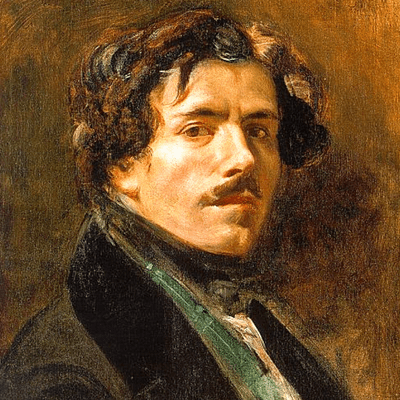
September 25, 2024
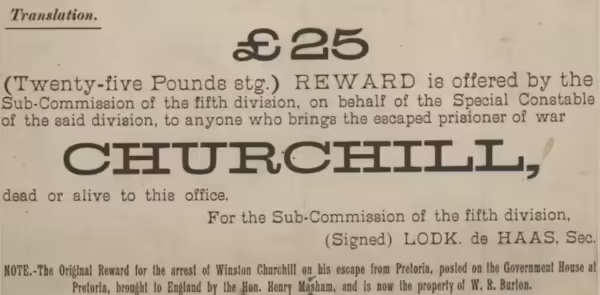
Most people know Winston Churchill for his role as the UK’s prime minister during World War II. But before he became PM, he was famous for another reason.
In 1889, at the start of the 2nd Boer War in South Africa, the 25 year old Churchill was captured by Boer soldiers and imprisoned in a POW camp. He then made a daring escape — with nothing but four chocolate bars and a crumbling biscuit in his pocket, he crossed over 300 miles of enemy territory on his quest for freedom.
Today we explore the most swashbuckling episode of Churchill’s early life, and what it can teach you about resilience, daring, and the mysterious workings of fate.

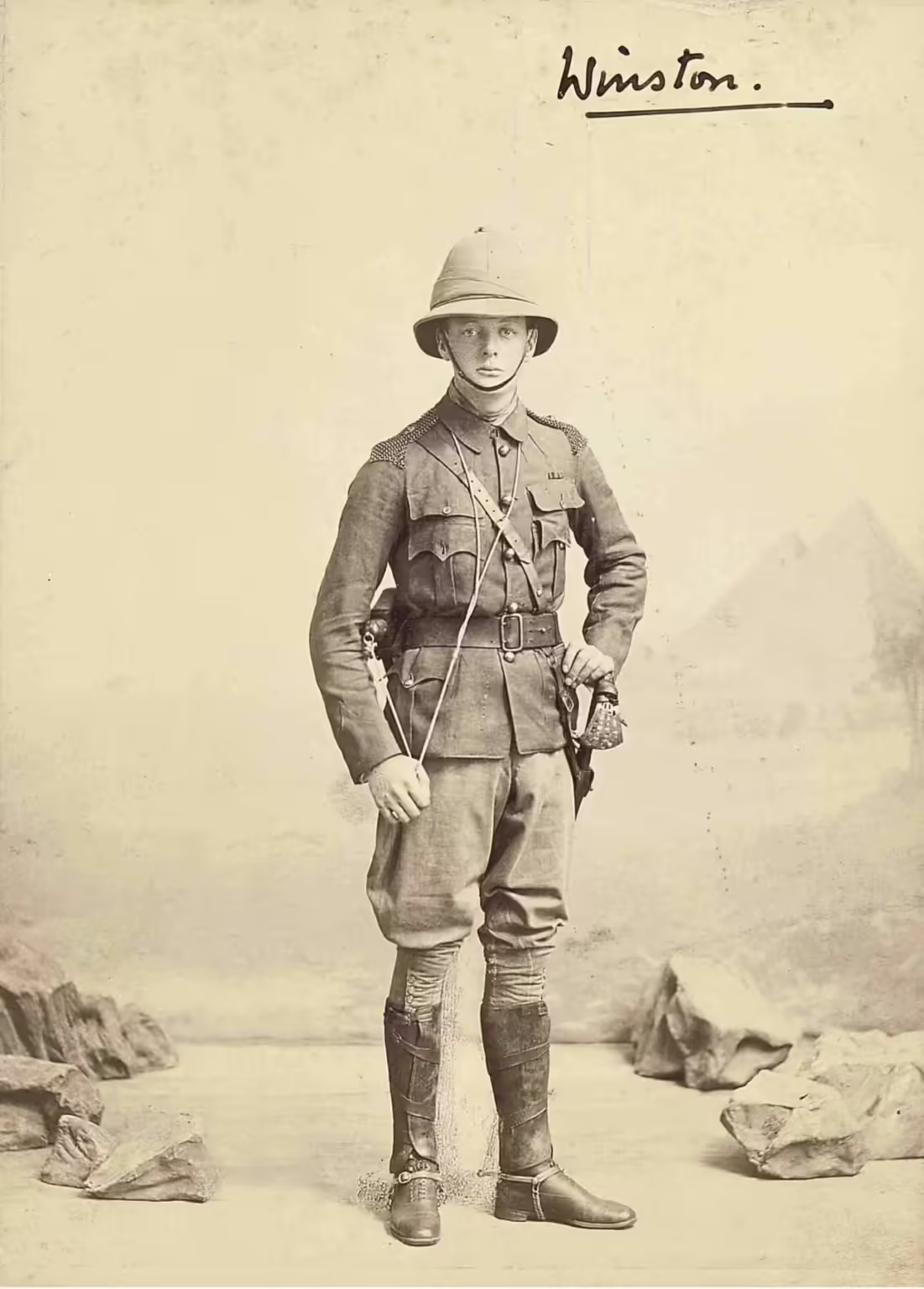
By the late 1890s, a young Churchill had already seen military action in Cuba, India, and Sudan. At the age of 23 he fought at the famous Battle of Omdurman, where he took part in the last great cavalry charge of the British Empire.
Believing it time to make his entrance into the realm of politics, he returned home and ran for parliament. He lost the election by a narrow margin. Dismayed but not disheartened, Churchill decided to return to where the action was — at that point, the 2nd Boer War was kicking off in South Africa. With 18 bottles of Scotch whiskey in tow, Churchill sailed down to the Cape Colony.
He arrived in Cape Town on October 30th, 1899, exactly one month before his 25th birthday. Little did he know, the loss he suffered in the parliamentary election would lead to his greatest triumph yet — fate often acts in unexpected ways…

Churchill’s official job in South Africa was that of a war correspondent — but he knew that in order to get the best stories, he had to go where the action was. He volunteered to accompany troops on the riskiest missions, and soon enough he got what he was looking for.
Just 16 days after his arrival, Boer soldiers ambushed a reconnaissance train he traveling was on, derailing and shelling it. While Churchill and the soldiers put up a valiant resistance for over an hour, it was a lost cause — they soon had no choice but to surrender, at which point they were escorted back to the enemy capital of Pretoria.
Churchill bid his time in prison, but was impatient to escape. He hated his time in the POW camp “more than I have ever hated any other period in my whole life.” But by carefully tracking prison guard movements, he identified when they would have their backs turned to him…
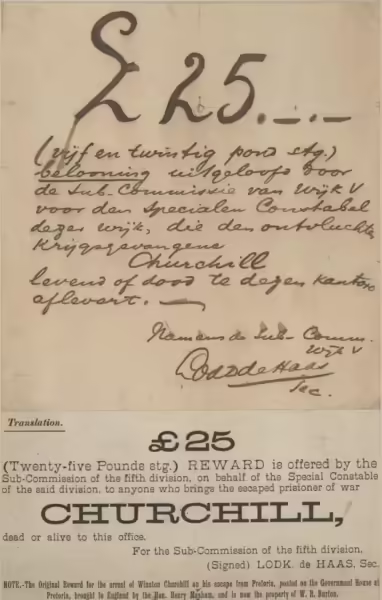
On the night of December 12, 1899, Churchill seized his opportunity and jumped from the bathroom window, scaling the prison wall to freedom. But before taking flight, he courteously left a note for his captors:
“I have the honour to inform you that as I do not consider that your Government have any right to detain me as a military prisoner, I have decided to escape from your custody.”
Unfortunately for Churchill, the Boer government did in fact believe they had a right to detain Churchill — and they did not intend to let him off easy. As the young bulldog made his escape, flyers were circulated to announce the bounty on Churchill’s head: he was officially wanted, dead or alive.
Churchill found himself in quite the predicament — he was 300 miles deep in enemy territory with no map, no ability to speak the local language, and a bounty on his head. In his own words, he had with him nothing more than “four slabs of melting chocolate and a crumbling biscuit” — it was not an enviable position.
Nevertheless, Churchill pushed bravely on. That night he stowed away on the train, but was forced to abandon it before daybreak. He was smack in the middle of the South African wilderness, where his “sole companion was a gigantic vulture, who manifested an extravagant interest in my condition, and made hideous and ominous gurglings from time to time.”
Hiding in the brush by day and traveling by night, Churchill carried on wearily. Eventually he came to a settlement and tried his luck, knocking on the door of a farmhouse. In a scene straight out of Hollywood, the owner answered the door with a gun in hand, demanding to know who Churchill was. The fugitive relented and told him the truth, at which point he was met with the most incredible response:
“Thank God you have come here! It is the only house for twenty miles where you would not have been handed over. But we are all British here, and we will see you through.”
Churchill stowed away at the bottom of a mine shaft for several days, and once the coast was clear he was hidden amongst wool bales on a train bound for Portuguese East Africa. As the train pulled into its final station, the glorious sound of the Portuguese tongue greeted his ears — he was out of enemy territory, officially a free man.
He headed promptly for the British embassy, and finally made the trip home to England. There he was welcomed as a hero, a powerful symbol of British resilience in the face of all odds. It was his greatest moment, and would only be outshined 45 years later, when he led his nation to victory in WWII.
Churchill’s loss in the parliamentary elections of 1899 seemed like just that — an unequivocal loss and setback. But had Churchill won the election, he never would have gone to South Africa.
Losing the election led him to embark on his greatest adventure yet, one for which he would be hailed a hero upon his return to Britain. Fate works in interesting ways, which is why you should always look for opportunity in the midst of a (seeming) defeat.
Churchill made a name for himself by seeking out adventure. He went where the action was, and embraced whatever fate would befall him. He never doubted that things would work out for him in the end, and even wrote to his mother: “I do not believe the Gods would create so potent a being as myself for so prosaic an ending.” A bit cocksure, no doubt — but prophetically accurate.
This is a quote from Saint Joan of Arc, but it applies well to Churchill’s escape from prison. Despite not having the answers, despite not knowing where to go, despite all odds being against him — Churchill still chose to act. And then, when it mattered most, he knocked on the door of the only house in 20 miles that would help him to safety.
Was it coincidence, or providence? While it’s impossible to prove either way, what is certain is that Churchill acted — and fate smiled fondly upon him for it.
If you enjoy my work and want to show your support, the best way to do so is by purchasing a fresh bag of Imperium Coffee.
All the proceeds go towards sharing more stories like this and helping others learn from the lives of great men — and since you’re on this list, you can use the code INVICTUS10 for 10% off your order!
Thanks as always for your support, and I look forward to seeing you on this week’s Spaces.
Ad finem fidelis,
Evan